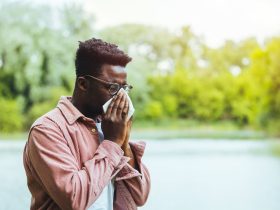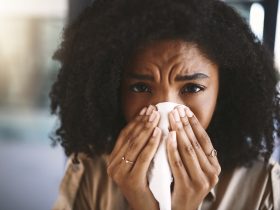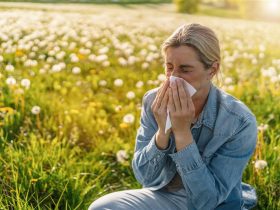What is hay fever?
Hay fever or seasonal allergic rhinitis is a common condition that affects millions of people around the world. The body’s immune system overreacts to normally harmless chemicals, such as pollen from grasses, flowers, weeds, or trees, in this allergic disorder. Histamine, a substance that induces inflammation, is released from cells in the nose, eyes, and airways as a result of the pollen. Hay fever season is usually between March and September.
Having asthma or eczema increases your chances of being affected by hay fever.
What are hay fever symptoms?
- Sneezing or coughing
- Itchy, blocked or runny nose
- Loss of smell
- Pain around temples
- Headaches and sinus pain
- Red, itchy, puffy or watery eyes
- Itchy throat
- Fatigue

How do I avoid triggers?
- Keep the house and car windows closed, especially when pollen count is high (7am to 9am and 5pm to 7pm)
- Avoid large grassy areas, woodland, cutting the grass, pollutants and car fumes.
- As soon as you get home change clothes, wash your face, hands, hair, and rinse eyes.
- Use petroleum jelly inside your nose to trap pollen.
- Stay indoors as much as possible during high pollen count.
- Do not dry your clothes outside to avoid pollen sticking to your clothes.
- Buy a pollen filter for the air vents of your vehicle.
How do I treat hay fever?
Unfortunately, there is no cure for hay fever and you can’t prevent it but you can manage your symptoms. Speak to your local pharmacist or talk to a GP online to get advice on the treatment for your symptoms.
Over the counter treatments include:
- Antihistamine tablets and syrups:
It’s best to take these before the symptoms begin. - Nasal sprays:
Start taking nasal sprays before hay fever season begins and continue through the season, even if you do not have any symptoms. - Eye drops:
Eye drops containing sodium cromoglicate or lodoxamide may be useful. If you wear contacts, check with your optician before using any eye drops. - Painkillers:
Paracetamol and ibuprofen to treat headache and sinus pains. - Lozenges:
To help treat throat symptoms - Sudafed:
To treat nasal congestion.
When should I see my GP?
If you experience wheezing, shortness of breath, or chest tightness, if you’re pregnant or breastfeeding, or if your symptoms are not relieved by over-the-counter medications, it’s time to see a doctor.
Consult with your local GP or get GP advice online for a more convenient way to treat your hay fever with the qualified, virtual doctors here at Eirdoc.
Check pollen forecast HERE
References




